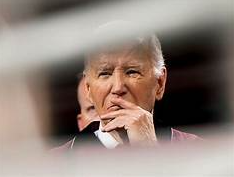The president may have only himself to blame for potential election fallout in November.
Histories of the CIA reveal America’s wealth is rooted in covert actions that challenge its moral authority. These histories underscore a fundamental truth: predicting the future is impossible. Again and again, influential officials in Washington, gathering in Georgetown’s prestigious townhouses, strategized grand moves on the global chessboard—only to see them unravel with unintended consequences.
Through coups, assassinations, and orchestrated elections, the CIA sought to safeguard America’s power. But these maneuvers backfired, breeding generations of enemies driven by the oppression they experienced from these plans. The “domino theory” that justified decades of intervention turned out to be a simplistic idea, misguided and wrong. Those in power were so intoxicated by their own certainty that they became agents of chaos, often failing even by their own standards.
These historical errors echo in Joe Biden’s current administration. Overconfidence can lead leaders down paths that sabotage their goals. For Biden, this historical pattern suggests that his issues are more about personal missteps than about ideological divisions in the Democratic Party. It’s not a “left” problem he faces, but rather a Biden problem—stemming from his own policies and decisions.
Biden’s administration faces a unique challenge in convincing voters that his strategy is sound, a task made harder by public perception. Similar to how the CIA’s overreaching actions alienated people globally, Biden’s political choices may risk alienating his own voter base. The administration’s efforts may ultimately turn into self-sabotage if he misjudges public sentiment.
The Democratic Party faces an election where its success may hinge more on Biden’s personal image and decisions than on ideological loyalty. Critics within the party are voicing that Biden’s challenges stem not from “leftist” agendas, but from policies and stances that seem out of touch. His advisors need to recognize that strategic misjudgments could weigh heavily on the president’s reelection campaign.
Biden’s administration must grapple with the reality that his standing in the polls may not improve without addressing his own weaknesses. This situation mirrors the missteps of past American strategies where leaders underestimated the risks of pushing flawed theories. With November approaching, Biden’s team faces an urgent need to realign, lest he become a victim of his own policy miscalculations.
In the end, Biden’s “problem” may simply be himself, as voters consider whether his leadership aligns with their aspirations for the country’s future. The upcoming election could ultimately reflect Biden’s ability—or inability—to learn from historical lessons about the dangers of overconfidence and political miscalculation.

